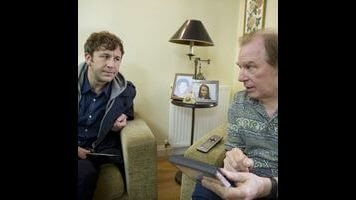Family Tree: “Welcome To America”

After four episodes set in Britain, Family Tree announces its move to the States with a blast of generic rock guitar and Tom, dressed in a dorky-looking short-sleeved shirt and even dorkier pair of shorts, explaining to the camera that he’s just arrived at LAX, which is in Los Angeles, though he doesn’t know what the “X” stands for. Before he can find out, his American cousins, Al Chadwick (Ed Begley, Jr.) and his wife Kitty (Carrie Aizley) arrive; they dash up to him and show him a big scrap of brown paper on which Kitty has written the message, “WELCOME TO AMERICA, TOM.” (“I made this today,” she says, very proudly.) Once in the car, Al asks Tom that most treacherous of broad questions: “Do you like music?” Then Kitty boils it down to, “Do you like R & B?” Tom says that he does, so Al jacks up the stereo, and out comes an awkward, blaring sound that suggests the offspring of the “blues” band the Steve Buscemi character in Ghost World experienced as his own personal aural waterboarding. “Does ‘R & B’ mean the same thing here?” Tom asks politely.
When Christopher Guest and his actors are really cooking, their brand of character comedy has a style all its own. That’s an accomplishment, and there are people who would freely admit they wouldn’t have had the careers they’ve had if they hadn’t had Guest’s footsteps to follow. But some of those imitators have also brought more edge and energy to that style than Guest has always been able to muster. Long before he was a Saturday Night Live cast member, Guest was part of the National Lampoon circle, and in interviews, he’s expressed regret for the extreme nastiness some of the satire he was part of back then. His devotion to comedy without cruelty or condescension toward the characters is admirable, but when he doesn’t have, say, a Larry Miller around to let us in on his little secret as a suicide negotiator—“They always jump.”—his work can become a rarefied, formal ritual for comedy geeks, who can appreciate the precision of the characters’ eccentricities without minding whether or not they’re actually laughing much.
In the first half of Family Tree, the gentleness of the satire, combined with Chris O’Dowd’s intensely likable but wistful presence and a premise that provided for a lot of focus on the ephemera of the past—theatrical careers based on Gilbert and Sullivan and pantomime horses, Tom’s father’s fixation on unwatchably bad “classic” Brit-coms—made for a show with a slow pace and a quiet heartbeat. But the sheer novelty of the content—you don’t see a lot of cable comedies that will stop dead in their tracks to deliver a pitch-perfect parody of Are You Being Served?-style British TV comedy—went a long way toward making up for the show’s drowsier moments. The move to America results in a trade-off: Everything feels a little more familiar in this episode, but actors like Begley, Fred Willard (as Begley’s asshole of a next-door neighbor), and Guest himself do wonders for the show’s energy level. (Guest plays one of Tom’s distant relatives, a drawling dullard who begins to seem more and more creepy as he starts to babble about his Peruvian wife, who’s been missing for three years.)
As in Arrested Development, Begley jumps at the chance to make fun of his off-screen image as a privileged hippie do-gooder; Al is looking forward to the day when society will pay for its sins, when “you turn on the lights, and nothing happens,” and explains that this is “why I need the SUV with the high clearance, to get over the barricades and get home” when it all comes crashing down. (He’s also a historical-conspiracy freak who needs little encouragement to form suspicion that his ancestor was involved in the assassination of President Kennedy.) But the episode is built so that Fred Willard can tuck it in his back pocket and carry it home. He creates an atmosphere of gross, self-satisfied vulgarity that lays waste to any trace of quaintness and cuteness. ("I don't mean to be crude, saying 'hanky panky,' but there's there's ladies present, so I didn't want to say 'fuck.'") Family Tree gives you a lot to be grateful for; it I'm reserved in my enthusiasm for it, it's because I can't help wishing for Tom's own story to amount to more than playing straight man to a bunch of colorful loons, and I'm not sure that it ever will. Talking about how he's been affected by his breakup and the loss of his job, Tom says that it feels like it's "time to stop sitting around, waiting for my life to happen." The worst that can be said about Family Tree is that, sometimes, it can make you feel that you're spending eight very pleasant weeks waiting for a show to happen.
Stray observations:
- The Chadwicks have a cat, which Tom can’t have too near him because, he tells them, he’s allergic. Later, Tom confides to the camera that “I’m not allergic to cats. I just don’t like them.” In fact, he regards them as “the devil’s spawn.” Expanding on that, he says, “Some people don’t like cats because they don’t know what they’re thinking. But I don’t like cats because I know exactly what they’re thinking. They’re thinking, why don’t we all get together and scrape out Tom’s eyes in his sleep.”
- The safest response to practically anything Fred Willard says: “I don’t know what that means, but okay."
- Nina Conti is off-screen this episode, and is missed. Happily, though, Monk knows how to Skype.
- Erik sends his regrets. He'll be back next week.